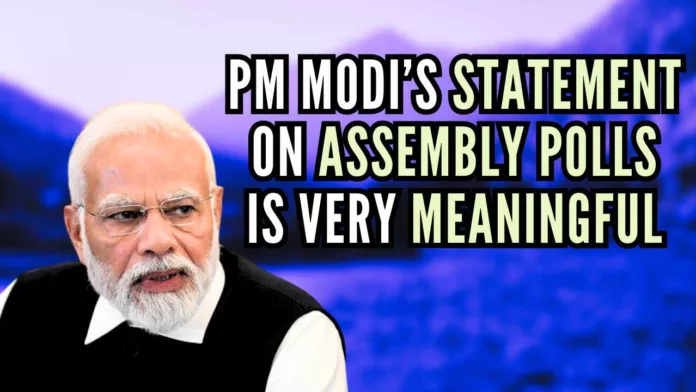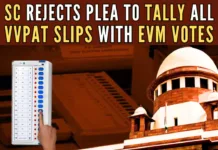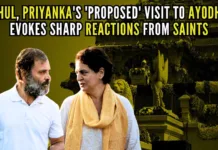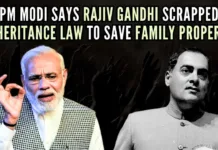
What did PM Modi say?
Prime Minister Narendra Modi did exceedingly well on December 29 to expose the ambivalent approach of JL Nehru towards the highly strategic Jammu and Kashmir (J&K) and how he and the Congress betrayed the nation by retaining a purely temporary Article 370 for decades willfully overlooking its baneful influence on the polity and on J&K and the people, especially women-folk and certain weaker sections, it housed.
Nehru’s ghiste ghiste statement was just a hoax
Actually, that day, PM Modi gave an interview to India Today. During the interview, he explained away the state of the nation and debunked the charge that Bharat under his regime has not been performing well in any sphere, including socio-economic and developmental spheres. In the process, he also talked about atrocious Article 370; Nehru; J&K, and Ladakh. He also expressed his views on the plight of the people of J&K and Ladakh before and after the abrogation of J&K’s separate status, reading down of Article 370, and conversion of the erstwhile state into Union territory of J&K and Union Territory of Ladakh. (These reforms were introduced on August 5-6, 2019.)
Reflecting on Article 370 and Nehru, PM Modi, among other things, said: “The issue in front of the country is not the Supreme Court bringing legal closure (on December 11, 2023), the people have an issue with the delay in terminating a temporary provision (Article 370). Despite Nehruji having said in Parliament that ‘Ghiste ghiste ghis jayega’ (it would erode and disappear one day), for seven decades, the people of J&K were deprived of their rights, especially women and those from underprivileged communities.’’
Reengineering processes
As for the prevailing state of affairs in J&K, the PM, inter-alia, said: ‘Terrorism has hit record lows while tourism is hitting record highs…and the Constitution of India, which protects rights of socially vulnerable groups, is fully applicable to the people of the Union Territory…The Central government has adopted a multi-pronged approach with focus on security, development, investment infrastructure, and human capital…We are absolutely on the path of ensuring sustainable peace, stability, and prosperity for the people of the region by improving their living standards, promoting economic growth, and generating employment opportunities…A complete reengineering of government processes has been done through reforms.’’
“For the first time, the people of J&K and Ladakh are free with Article 370 gone forever…people in the two Union Territories now can shape their destinies with their own hands…People of J&K and Ladakh are today seeing all-around progress in every aspect be it democracy, development, or dynamism…Terrorism has hit record lows while tourism is hitting record highs…International events like G20 meetings have taken place and the world has witnessed the hospitality and pristine beauty of J&K…Women of the UT are today emerging in various fields from sports to entrepreneurship. New industries are opening up,’’ the PM also said.
On Assembly elections
What the PM said about Nehru and Article 370 and what he said about what happened on and after August 5-6, 2019 was very significant. Indeed, these constituted some of his spectacular achievements and the whole nation recognizes and appreciates all of them. However, what was all the more significant was his statement on the Assembly elections in J&K.
What exactly did he say? He, among other things, said: “The UT is already represented in the Parliament at the national level. There are five MPs in Lok Sabha from J&K, including three of the National Conference, all from Kashmir valley, and two from the Bharatiya Janata Party (BJP), both in Jammu division…At the local level, for the first time, we have been able to take democracy to the grassroots. A three-tier Panchayati Raj System has been established in J&K and 35,000 leaders elected at the grassroots.’’
Not just this. He also asked: “Why do we underestimate the importance of these elections?”
Assembly elections and dangerous ramifications
“Why do we underestimate the importance of these elections” should serve to indicate many things. One, the possibility of Assembly elections in J&K in the near future is too remote, notwithstanding the SC’s direction to the Election Commission of India to take steps to hold elections by September 30, 2024. Two, the Modi government is, it appears, fully aware of the dangerous ramifications of assembly elections in J&K. And, one of the dangerous ramifications obviously will be the retransfer of the state power to the fundamentally subversive Kashmiri leadership, which is rabidly anti-Bharat, anti-Jammu, anti-Ladakh, anti-Hindu and anti-Buddhist, and which is fundamentally pro-Pakistan and China and terrorist-friendly. The statements the Kashmiri politicians, including Farooq Abdullah, Ghulam Nabi Azad, Omar Abdullah, Mehbooba Mufti, Sajad Lone, Altaf Bukhari, Saif-ud-Din Soz, made after August 5-6, 2023 all establish that they will play a sinister mischief if they recapture the state power. The Modi government, it appears, knows all this and that’s the reason he didn’t give any timeline as far as the assembly elections in J&K was concerned. There are reasons to believe that Kashmiri politicians and their supporters in the Congress-led anti-Sanatan I.N.D.I Alliance, without any exception, will unleash a no-holds-barred propaganda blitz against PM Modi’s statement on Assembly elections. The reasons are not really difficult to fathom.
Why separate Jammu state
All friends and well-wishers of Bharat will surely welcome the PM’s statement on Assembly elections taking into consideration the paramount national interest. At the same, however, it would be highly desirable to feel the pain and appreciate the woes of the people of Jammu province, who suffered immense socio-cultural and politico-economic losses at the hands of the New Delhi-backed Kashmiri politicians between October 1947 and June 2018 and who have been suffering since 2018 for the sins of Kashmiri politicians of all hues.
Why should they suffer? They were, and are, intensely pro-Bharat. They, like the internally displaced and persecuted Kashmiri Hindus, who have been demanding a separate homeland within Kashmir since December 28, 1991, have been representing Bharat in this strategic region. They have sacrificed thousands of precious lives to defend the nation while fighting out terrorists. They deserve special treatment. They, like the persecuted Kashmiri Hindus, deserve a government that is of them, by them, and for them and which is fully Bharat in its approach and actions.
The nation would further appreciate PM Modi and Home Minister Amit Shah if they separate Jammu from Kashmir. Such a reorganization plus the creation of a separate homeland for seven lakh Kashmiri Hindu refugees within Kashmir will go a long way in helping New Delhi defeat what the Panun Kashmir, a frontline organization of the hounded-out Kashmiri Hindus, rightly term as the “jihadi war”.
Note:
1. Text in Blue points to additional data on the topic.
2. The views expressed here are those of the author and do not necessarily represent or reflect the views of PGurus.
For all the latest updates, download PGurus App.
- ‘Kashmir My core constituency’: Revisiting July 12, 2003 to understand politics, Omar Abdullah-style - March 15, 2024
- Total deviation from traditional approach: Seven takeaways from PM Modi’s March 7 Srinagar visit - March 9, 2024
- Status of political parties: Why is further J&K reorganization imperative? - March 1, 2024










